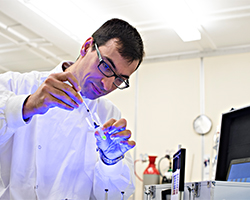30 Oct 2015
Loughborough University unveils world’s first lab-in-a-briefcase
 Image: Dr Nuno Reis demonstrates how the disposable microfluidic test strip works.
Image: Dr Nuno Reis demonstrates how the disposable microfluidic test strip works.
Academics at Loughborough University hope to boost early detection rates of cancer in developing countries with their portable lab-in-a-briefcase that can operate even at high temperatures.
Believed to be the first kit of its kind dedicated to the portable measurement of cancer biomarkers, the concept is the brainchild of Dr Nuno Reis, a Lecturer in Chemical Engineering. The full study has been published in the Lab on a Chip journal.
The number of people dying from cancer in developing countries is on the increase, partly due to steadily ageing populations, but also due to limited access to proper diagnostic tools. Cancer is a leading cause of death worldwide, accounting for over 8 million deaths per year, and 70% of the world’s cancer deaths occur in Africa, Asia and Central and South America. The number of new cancer cases is expected to rise by 70% over the next two decades[1].
With the help of his Research Associate Ana Isabel Barbosa, Dr Reis has developed a solution for diagnostic testing in remote areas of developing countries that lack adequate technology to support a full laboratory.
The lab-in-a-briefcase comprises of four components; a manually driven multi-syringe device capable of performing up to 80 simultaneous tests from whole blood samples at any one time; microwell plates pre-loaded with assay reagents; a portable USB-powered film scanner to image the test strips; and a portable computer for real-time data analysis.
The entire system can be carried in a small briefcase, handbag or laptop case, and requires just one operator with minimal training to conduct the test within 15 minutes – with no need for additional equipment or instruments.
One of the remarkable features of the lab-in-a-briefcase is that it uses whole blood without the need for any sample preparation – a previously challenging task outside of a laboratory setting.
[1] World Health Organization World Cancer Report 2014 (http://www.who.int/mediacentre/factsheets/fs297/en/).














